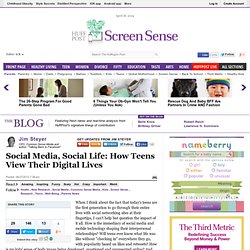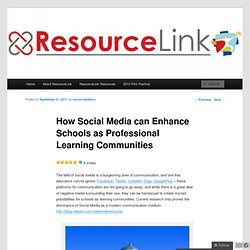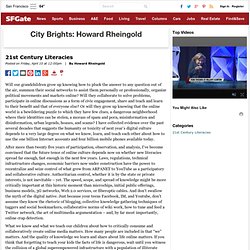

Jim Steyer: Social Media, Social Life: How Teens View Their Digital Lives. When I think about the fact that today's teens are the first generation to go through their entire lives with social networking sites at their fingertips, I can't help but question the impact of it all.

How is the immediacy of social media and mobile technology shaping their interpersonal relationships? Will teens ever know what life was like without "checking in" everywhere they go, with popularity based on likes and retweets? How is my kids' sense of body image being developed, questioned and represented online? And, most importantly, what can I do as their dad to set the best possible example and help them maximize the tremendous opportunities that social media presents? Until this week, when Common Sense Media released "Social Media, Social Life," a research study to try to understand how teens view their own digital lives, none of us had answers to these questions.
The research tells us so much. Social media is an amplifier and a reflection of real life. Our kids are watching us. Resourcelinkbce. The field of social media is a burgeoning area of communication, and one that educators cannot ignore.

Facebook, Twitter, LinkedIn, Diigo, GooglePlus – these platforms for communication are not going to go away; and while there is a great deal of negative media surrounding their use, they can be harnessed to create myriad possibilities for schools as learning communities. Current research only proves the dominance of Social Media as a modern communication medium: This is the first of a series of posts planned in the area of social media and schools as learning communities. It is too big a topic to cover adequately in one post, and the value of social media tools as resources for learning is too great not to be addressed. This post will consider what the term ‘social media’ connotes, and ways in which it may be used to overcome some of the obstacles schools face when attempting to develop a professional learning culture. Social Media – what do you need to know? Here’s how: 1. 2. 3. 4. Mhoggin. Libraries%20and%20Digital%20-%20Research%20into%20the%20use%20of%20digital%20media%20in%20libraries%20to%20develop%20audiences%20for%20reading.
City Brights: Howard Rheingold. Will our grandchildren grow up knowing how to pluck the answer to any question out of the air, summon their social networks to assist them personally or professionally, organize political movements and markets online?

Will they collaborate to solve problems, participate in online discussions as a form of civic engagement, share and teach and learn to their benefit and that of everyone else? Or will they grow up knowing that the online world is a bewildering puzzle to which they have few clues, a dangerous neighborhood where their identities can be stolen, a morass of spam and porn, misinformation and disinformation, urban legends, hoaxes, and scams? I have collected evidence over the past several decades that suggests the humanity or toxicity of next year’s digital culture depends to a very large degree on what we know, learn, and teach each other about how to use the one billion Internet accounts and four billion mobile phones available today.
Phil Bradley:Internet search, Librarians, search engines, web search. British children feel 'sad' without internet connection.